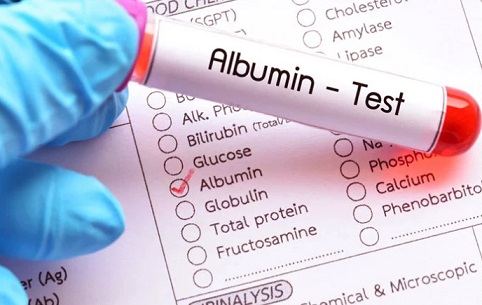Nikhil Prasad Fact checked by:Thailand Medical News Team Nov 24, 2024 1 year, 3 weeks, 6 days, 14 hours, 29 minutes ago
Medical News: A groundbreaking study from researchers at the National and Kapodistrian University of Athens, Greece, reveals a significant link between the lactate-to-albumin ratio (LAR) and mortality rates in patients with severe COVID-19 admitted to the Intensive Care Unit (ICU). This study highlights the potential of LAR as a reliable marker for predicting outcomes in critically ill individuals, possibly offering medical teams a new tool for early intervention.
 Lactate-to-Albumin Ratio - A New Prognostic Tool in Severe COVID-19 Cases
Why Is the Lactate-to-Albumin Ratio Important?
Lactate-to-Albumin Ratio - A New Prognostic Tool in Severe COVID-19 Cases
Why Is the Lactate-to-Albumin Ratio Important?
Critically ill patients often experience changes in lactate and albumin levels due to systemic inflammation and organ stress. Elevated lactate levels usually indicate impaired oxygen delivery or increased stress metabolism, while low albumin levels are a common marker of poor nutritional or inflammatory status. When combined as a ratio, these metrics provide a unique insight into the severity of illness.
This
Medical News report explores findings from 805 patients hospitalized during the COVID-19 pandemic, offering a comprehensive analysis of how LAR can predict survival rates more effectively than other commonly used indicators, like lactate levels alone. Researchers sought to establish whether this ratio could outperform traditional prognostic tools.
Key Findings of the Study
The study followed 805 ICU patients, primarily older adults (median age 67 years), 68% of whom were male. Over 48% of the participants did not survive, highlighting the severity of the cases analyzed. Researchers observed that:
-LAR Values: The median LAR was 0.53, with survivors exhibiting significantly lower ratios compared to non-survivors.
-Mortality Risk: A higher LAR strongly correlated with increased mortality. The study determined that the optimal LAR cutoff for predicting death was 0.57, with 63% sensitivity and 73% specificity.
-Survival Analysis: Patients in the highest LAR quartile had notably worse survival rates compared to those in lower quartiles.
-Better than Lactate Alone: The lactate-to-albumin ratio was shown to predict outcomes more accurately than lactate levels alone, as evidenced by a higher area under the receiver operating characteristic curve (0.71 vs. 0.68).
The researchers also confirmed that LAR consistently predicted mortality across subgroups defined by age, sex, hypertension, and cardiovascular disease.
How Does the LAR Work?
Lactate levels increase in response to low oxygen supply or metabolic stress, while albumin levels decrease during inflammation or malnutrition. The combination of these two measurements offers a more nuanced picture of a patient’s overall health. Elevated LAR likely reflects both physiological stress and poor systemic reserves to comba
t illness, making it a powerful indicator of severe outcomes.
Practical Implications for ICU Teams
This study's findings have several critical implications:
-Quick and Accessible: The LAR can be easily calculated from routine blood tests already performed for ICU patients, requiring no additional equipment or procedures.
-Prognostic Value: The LAR could assist healthcare providers in stratifying patients based on their risk levels, helping to prioritize resources and interventions.
-Potential Integration: Incorporating LAR into established scoring systems, such as the APACHE II score, might enhance prognostic accuracy further.
Study Limitations and Future Directions
Although the study provides compelling evidence, it has limitations. Being a single-center retrospective analysis, its findings may not apply universally.
Additionally, factors like nutritional status or liver function, which influence albumin levels, were not fully accounted for. Future research should investigate dynamic changes in LAR over time and their impact on patient outcomes.
Conclusion: A Promising New Marker
The lactate-to-albumin ratio offers a promising, simple, and cost-effective method to assess the severity of illness and predict mortality in critically ill COVID-19 patients. Unlike other markers, it combines the effects of metabolic stress and systemic inflammation into a single, actionable measure. By integrating LAR into routine practice, ICU teams could significantly improve risk prediction and care strategies for patients battling severe conditions.
The study findings were published in the peer-reviewed Journal of Clinical Medicine.
https://www.mdpi.com/2077-0383/13/23/7106
For the latest COVID-19 News, keep on logging to Thailand
Medical News.
Read Also:
https://www.thailandmedical.news/news/potential-for-tim3-as-a-biomarker-in-covid-19-severity-and-long-covid-complications
https://www.thailandmedical.news/news/hungarian-scientists-identify-novel-biomarker-of-mitochondrial-dysfunction-in-long-covid
https://www.thailandmedical.news/news/club-cell-secretory-protein-16-as-a-biomarker-for-predicting-severity-of-covid-19-and-h1n1
https://www.thailandmedical.news/news/covid-19-causes-blood-dna-methylation,-a-potential-biomarker-for-long-covid-severity
https://www.thailandmedical.news/news/hyaluronic-acid-as-a-key-biomarker-for-covid-19-mortality
https://www.thailandmedical.news/news/japanese-study-finds-that-growth-differentiation-factor-15-can-be-used-as-a-predictive-biomarker-of-long-covid-in-non-hospitalized-patients
https://www.thailandmedical.news/news/japanese-scientists-identify-new-fibrinolytic-biomarkers-that-can-predict-those-at-risk-for-covid-19-severity
https://www.thailandmedical.news/news/long-covid-news-icahn-researchers-identify-blood-biomarkers-for-long-covid-while-showing-immune-and-hormone-disruptions-in-those-afflicted
https://www.thailandmedical.news/news/german-study-finds-urinary-glycosaminoglycans-can-be-used-as-biomarkers-to-predict-outcome-in-covid-19-and-community-acquired-pneumonia
https://www.thailandmedical.news/news/japanese-study-finds-that-soluble-clec-2-is-a-potential-predictive-biomarker-for-the-need-for-oxygenation-during-covid-19
https://www.thailandmedical.news/news/french-researchers-uncover-that-annexin-v-positive-extracellular-vesicles-could-be-promising-biomarkers-of-severe-covid-19-disease
https://www.thailandmedical.news/news/breaking-news-scientists-discover-sars-cov-2-mirnas-that-contributes-to-pathogenesis-and-can-be-used-as-a-biomarker-for-covid-19-severity
https://www.thailandmedical.news/news/covid-19-news-sars-cov-2-infections-lead-to-buildup-of-oxysterols-in-erythrocytes-which-can-be-used-as-a-biomarker-for-disease-severity
https://www.thailandmedical.news/news/latest-researchers-from-massachusetts-general-hospital-identify-biomarkers-that-can-be-used-to-confirm-neurocovid-presence-in-long-covid-patients
https://www.thailandmedical.news/news/study-shows-that-those-infected-with-sars-cov-2-also-manifest-high-viral-loads-of-torque-teno-virus-ttv-which-can-also-be-used-as-a-biomarker
https://www.thailandmedical.news/news/coronavirus-research-singapore-study-shows-that-mast-cell-activation-plays-key-role-in-severe-covid-19-and-chymase-could-be-an-important-biomarker
https://www.thailandmedical.news/news/yale-researchers-identify-blood-biomarkers-that-can-actually-predict-covid-19-severity-and-outcomes
https://www.thailandmedical.news/news/covid-19-biomarkers-harvard-study-shows-that-rapid-rise-in-crp-levels-predicts-respiratory-decline-and-outcome-in-covid-19-patients
https://www.thailandmedical.news/news/covid-19-research-chinese-doctors-who-discovered-sars-identify-new-biomarker-for-covid-19-disease-progression
